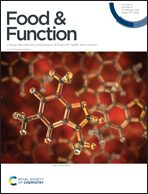The main anthocyanin monomer of Lycium ruthenicum Murray induces apoptosis through the ROS/PTEN/PI3K/Akt/caspase 3 signaling pathway in prostate cancer DU-145 cells†
Abstract
Anthocyanins have been reported to have effective chemopreventive activity. Lycium ruthenicum Murray is rich in anthocyanins and exhibits many biological activities. The purpose of this study was to investigate the effects and possible biological mechanism of the main anthocyanin monomer (Pt3G) of Lycium ruthenicum Murray on prostate cancer DU-145 cells. The cell proliferation was detected by methyl thiazolyl tetrazolium assay. The cell apoptosis rates were assessed by flow cytometric analysis and TUNEL assay. The expressions of apoptosis related proteins were evaluated by western blotting. Our data demonstrated that Pt3G inhibited cell proliferation, induced apoptosis and promoted cell cycle arrest at the S phase in a concentration-dependent manner (0, 100, 200 and 400 μg mL−1). Furthermore, it was shown that Pt3G decreased the mitochondrial membrane permeability through regulating the expressions of Bax and Bcl-2. Western blot analysis indicated that Pt3G significantly increased the expression of PTEN and then activated the PI3K/Akt-mediated caspase 3 pathway. In addition, our results also suggested that Pt3G activated the PTEN gene to induce the apoptosis of DU-145 cells by stimulating the overproduction of ROS. To sum up, these results indicate that Pt3G inhibits cell proliferation and induces apoptosis through the ROS/PTEN/PI3K/Akt/caspase 3 signaling pathway in prostate cancer DU-145 cells. Therefore, Pt3G of Lycium ruthenicum Murray may be a potential anti-proliferative agent for the prevention or treatment of prostate cancer.



 Please wait while we load your content...
Please wait while we load your content...